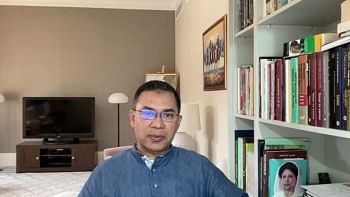Peruvians march against Fujimori pardon in 2nd day of protests

Hundreds of Peruvians filled the streets of downtown Lima on Monday to protest a pardon granted to former leader Alberto Fujimori, calling on President Pedro Pablo Kuczynski to step down in a second day of unrest.
Kuczynski, who said he pardoned Fujimori due to his ailing health, has not spoken publicly since announcing his decision on Christmas Eve, just three days after a handful of Fujimori loyalists in Congress saved Kuczynski from a vote that nearly toppled him.
Chanting "traitor" and "the pardon has got to go," protesters waved Peruvian flags and black-and-white photographs of the victims of a bloody counterinsurgency campaign during Fujimori's rightwing 1990-2000 government.
Police fired tear gas to disperse crowds and clashes between officers in riot gear and protesters erupted as the march made its way through downtown.
So far, three ruling party lawmakers have protested the pardon by announcing their resignations from Kuczynski's party, which controls just a fifth of congressional seats. The deputy human rights minister has also resigned, a government source said.
The pardon threatens to pitch Kuczynski's center-right government into a new political crisis less than a week after he narrowly escaped being forced from office by Congress in the wake of a graft scandal.
Kuczynski's office declined immediate comment but said he would deliver a message to the nation late on Monday.
Fujimori is a deeply divisive figure in Peru. While many consider him a corrupt dictator, others credit him with ending an economic crisis and quashing a leftist insurgency. The pardon cleared Fujimori of convictions for graft and human rights crimes during his rule.
"The fight against Fujimori was the emblem of an entire generation. But it's clear that fight isn't over," said Marco Sifuentes, a Peruvian journalist at the protest who came of age during Fujimori's government.
Less than a week ago, many of Fujimori's foes - a mix of human rights activists, leftists, technocrats, university students and unions - marched against the bid to oust Kuczynski that was led by Fujimori's daughter, Keiko.
As Keiko's supporters pushed the motion, Kuczynski himself fanned fears of a return to Peru's authoritarian past under Fujimori - calling the motion a legislative "coup.”
But he ended up defeating the vote thanks to Fujimori's son Kenji, who led a surprise defection from Keiko's party that deprived the motion of the supermajority needed for passage.
The subsequent pardon fueled speculation that Kuczynski had struck a deal to free Fujimori in order to save himself. His government has denied those allegations.
In a statement announcing the pardon, Kuczynski's office said a medical review had found Fujimori was suffering from "a progressive, degenerative and incurable disease" and that remaining in prison would put his life at risk.
Fujimori was rushed to the hospital on Saturday, where he remained in intensive care on Monday to treat a drop in his blood pressure and an abnormal heart beat, his doctor has said.


 For all latest news, follow The Daily Star's Google News channel.
For all latest news, follow The Daily Star's Google News channel. 



Comments